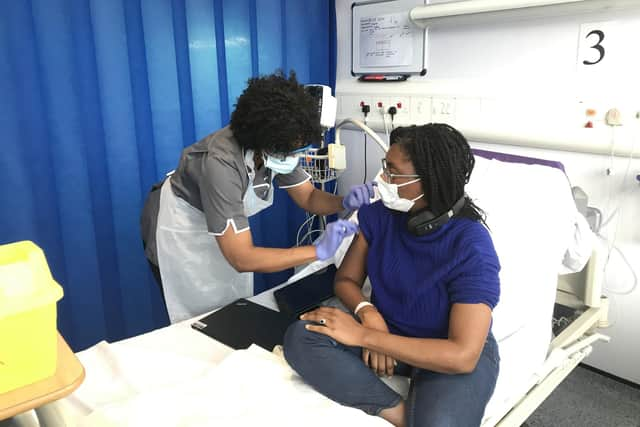Covid vaccination: Why tackling racism is important to making the roll-out a success – Dr Gwenetta Curry
Where you live and where you work have played a major role in the risk of exposure to the disease. There has been very little change between the first wave and second wave of the pandemic when it comes to racial and ethnic minorities in the UK.
The material conditions of ethnic minorities did not change between the first and second wave of infections. Furloughs and paid time off were not redistributed, occupational exposure did not change and living conditions remained the same.
Advertisement
Hide AdAdvertisement
Hide AdDuring the first wave of the pandemic, it became clear that those working in front-facing jobs and those living in deprived areas were more vulnerable to the virus than those who could self-isolate more freely and readily.
Taxi and cab drivers have one of the highest rates of infection compared to other occupations where the employees could work from home. The type of occupations in which ethnic minorities are over-represented include various service roles.
Black and Asian men are more likely to work in occupations that have had a higher risk of death involving Covid-19, such as transport, security and cleaning.
There’s a high proportion of Black women working as care workers and home carers (13.2 per cent) and higher portions of Black and Asian women in nursing, increasing their risk of contracting the virus.


According to the latest Office for National Statistics data on vaccine uptake, they found that adults in all ethnic minority groups were more likely to report vaccine hesitancy than white adults.
After controlling for age, sex, disability, underlying health condition, highest education level, housing tenure, and parent status, Black or Black British adults had the highest rate of hesitancy.
Black people were nearly seven times more likely to be vaccine hesitant than whites. These numbers are very concerning when the data shows that racial and ethnic minorities are still dying at a higher rate than their white counterparts.
The survey results showed that most people who were vaccine hesitant were concerned about the side effects and worried about the long-term effects on their health.
Advertisement
Hide AdAdvertisement
Hide AdVaccine hesitancy is a phrase that has been widely used to describe people who are unlikely to take the vaccine if offered to them.
The use of this term has led to the blaming and shaming of groups who have a historical reason to not trust the government or pharmaceutical companies.
House of Commons reports showed that over 60 per cent of Black people in the UK feel their health isn’t as protected as their white counterparts. High levels of distrust of the NHS are a clear indication that there is a need to repair the relationship between racial and ethnic communities and the government.
In order to generate a successful vaccination roll-out in Black communities, there should be a push to address more than just vaccine uptake. Structural racism and discrimination must be addressed to regain trust between the government and these communities.
Dr Gwenetta Curry is a lecturer of race, ethnicity and health at Edinburgh University
A message from the Editor:
Thank you for reading this article. We're more reliant on your support than ever as the shift in consumer habits brought about by coronavirus impacts our advertisers.
If you haven't already, please consider supporting our trusted, fact-checked journalism by taking out a digital subscription.
Comments
Want to join the conversation? Please or to comment on this article.